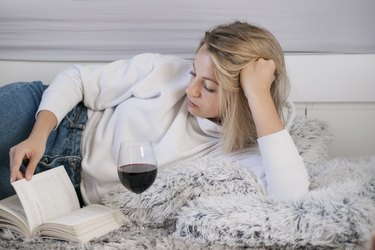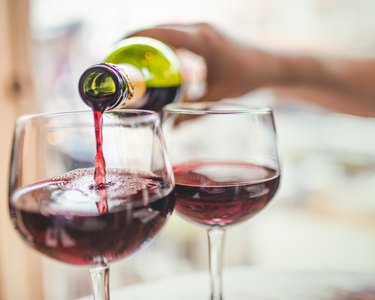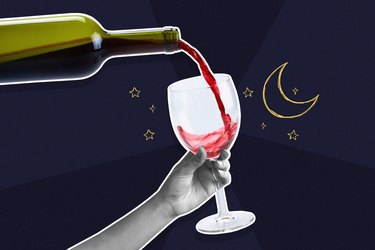
Drinking can raise blood pressure, and the combination of alcohol with blood pressure medications can heighten the effects of both. But that doesn't mean you should never enjoy an adult beverage. Here's what you need to know before you reach for the corkscrew.
Why Blood Pressure Numbers Matter
Video of the Day
Unmanaged high blood pressure can put pressure on arterial walls that can damage blood vessels and organs. This can lead to complications like heart attack, aneurism and dementia.
Video of the Day
Here's what your blood pressure numbers mean, according to the Mayo Clinic:
Blood Pressure Chart
Category | Systolic (mmHg) | Diastolic (mmHg) | |
|---|---|---|---|
Low Blood Pressure | |||
Normal | Less than 120 | AND | Less than 80 |
Elevated | 120 - 129 | AND | Less than 80 |
Stage 1 Hypertension | 130 - 139 | OR | 80 - 89 |
Stage 2 Hypertension | 140 or higher | OR | 90 or higher |
High blood pressure can often be managed by lifestyle modifications, namely diet and exercise, according to Kate Patton, MEd, RD, lead outpatient dietitian at the Cleveland Clinic, who works primarily within the preventive cardiology clinic.
"Most doctors are hesitant to put otherwise healthy patients on blood pressure medication, and most patients would prefer to avoid them as well," she says. "So, if patients can change things naturally, that's usually the first line of defense."
When lifestyle changes are not enough to manage blood pressure, doctors may recommend medication, sometimes more than one.
Blood Pressure Medications
Among the many medications used to treat hypertension are thiazide diuretics such as hydrochlorothiazide, antihypertensives such as clonidine (Catapres), angiotensin-converting enzyme (ACE) inhibitors such as perindopril (Coversyl) and calcium channel blockers such as amlodipine.
"Diuretics prevent the body from absorbing too much salt," Patton says. "The American diet tends to be very high in sodium, too much of which can cause your body to retain fluid. This fluid retention makes the blood vessels work harder."
Antihypertensives decrease heart rate and relax the blood vessels. ACE inhibitors and calcium channel blockers lower blood pressure by relaxing blood vessels, according to the American Heart Association.
Alcohol's Effect on High Blood Pressure Medicine
"The main impact alcohol can have on these medications is that it may increase side effects," Patton says. "Just lowering your blood pressure alone may initially make you feel a little bit lightheaded or dizzy, depending on the dosage and how well-adjusted you are to it. Alcohol does those same things — it can make you dizzy or drowsy, slow your thinking and lower your reaction time. The combination of medication and alcohol can exacerbate those effects."
Keep in mind frequent heavy alcohol use has been associated with unmanaged hypertension in people who still consistently take their medication as directed.
A January 2020 study in Korean Journal of Family Medicine found those who drank heavily more than once a week were more likely to have unmanaged diastolic and systolic blood pressure, despite taking their medications regularly. The study authors noted this association was not seen in people who drank frequently but not heavily.
"It's really not that you can't drink if you take medication for blood pressure," Patton clarifies. "Taking medication at the same time as having a glass of wine could be problematic, as could drinking excessively. Three drinks or more in a sitting is associated with raising your blood pressure." Drinking in moderation — one to two drinks per day — should be safe, she says.
If you intend to drink alcohol while taking blood pressure medication, it's a good idea to discuss appropriate timing with your doctor, especially if you take more than one drug.
- Mayo Clinic: “Alcohol: Does It Affect Blood Pressure?”
- Mayo Clinic: “High Blood Pressure (Hypertension) – Diagnosis & Treatment”
- Kate Patton, MEd, RD, CSSD, LD, lead outpatient dietitian, Cleveland Clinic, Cleveland, Ohio
- U.S. National Library of Medicine: “Clonidine”
- U.S. National Library of Medicine: “Amlodipine”
- U.S. National Library of Medicine: “Hydrochlorothiazide”
- U.S. National Library of Medicine: “Perindopril”
- Korean Journal of Family Medicine: “Uncontrolled Blood Pressure in Hypertensive Patients With High Medication Adherence: A Korean Nationwide Population-Based Study”
- AHA: "Types of Blood Pressure Medications"
Is this an emergency? If you are experiencing serious medical symptoms, please see the National Library of Medicine’s list of signs you need emergency medical attention or call 911.


